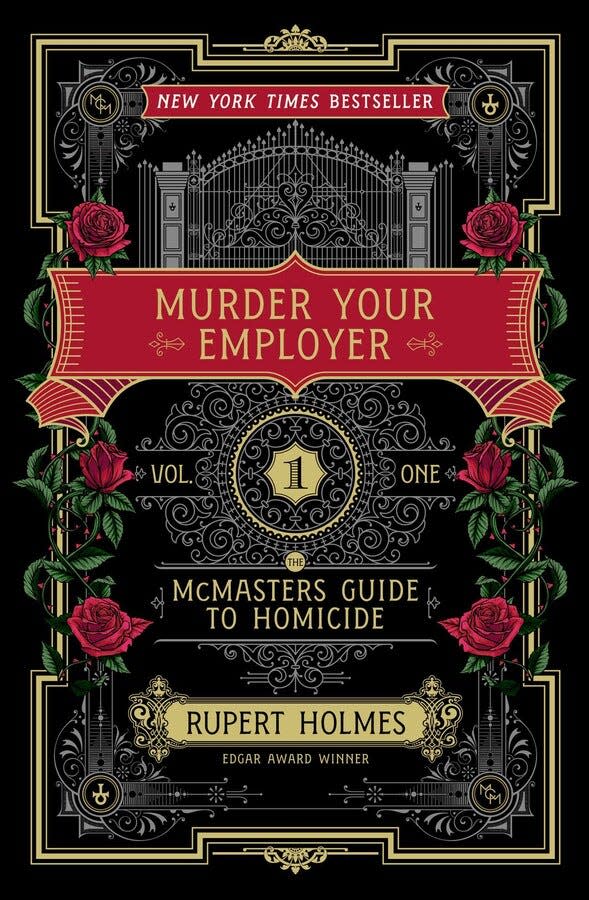Rupert Holmes creates 'Hogwarts for homicidalists' in new mystery 'Murder Your Employer'
Purchases you make through our links may earn us and our publishing partners a commission.
The daffodils have made a showy arrival on his hillside overlooking the Hudson, but Rupert Holmes really wants to talk about people pushing up daisies. As in the dead, and who made them that way.
In his latest novel, "Murder Your Employer: The McMasters Guide to Homicide" (Avid Reader Press, 400 pp., out now), Holmes creates a secret college for killers, where each student's thesis involves planning their boss' demise, then executing their plan, and their boss.
"Murder Your Employer: The McMasters Guide to Homicide" at Amazon for $25.20
"Murder Your Employer: The McMasters Guide to Homicide" at Bookshop for $26.04
Holmes has been on a book tour — taking him from Harvard to Hoboken, from Phoenix to the Bay Area, some in person, some via Zoom — reading from his book but also listening to audiences.
“Some of them said, 'I just saw the title and had to find out what it was,'” Holmes said.
What it is is the first wickedly clever volume in a promised series about the McMasters Conservatory for the Applied Arts, a sort of Hogwarts for homicidalists. Or, as one character puts it: "a finishing school for finishing people off."
At McMasters, life isn’t just for the living. It’s “an indispensable ingredient to homicide.”
5 new must-read books: Don Winslow's crime saga continues in 'City of Dreams'

From Pi?a coladas to murder mysteries
While he will forever be known as the singer-songwriter who gave the world "Escape (The Pi?a Colada Song)," Holmes knows his way around mysteries. He was twice honored with Edgar Awards from the Mystery Writers of America. Two of his Broadway musicals — "The Mystery of Edwin Drood" and "Curtains" — are whodunits. His first novel, “Where the Truth Lies,” made into a 2005 feature film starring Colin Firth and Kevin Bacon, also has a body count.
Born David Goldstein, his love of mysteries was set early. When he became a songwriter, he took a professional name that appended the given name of English poet Rupert Brooke to the surname of Arthur Conan Doyle's most famous creation, Sherlock Holmes. His dining room is lined with movie posters and artwork inspired by his Holmes namesake.
Sitting in his sunroom with a sweeping Hudson view, Holmes laughed easily about the McMasters world he has created, with impeccably rendered illustrations and a map by Broadway set designer Anna Louizos. He's clearly had fun getting away with “Murder,” and is eagerly populating his campus with a new batch of clever characters and situations.
'Above Ground': Fatherhood helped Clint Smith lean into 'levity' and 'silliness' in poetry
How it started, how it’s going
Holmes said the idea for the series was born of the flood of other titles.
“I noticed that there was a self-help book for absolutely every subject under the sun," he said. "These are real titles: 'The Talmud for Dummies,' 'Tiny Houses for Dummies,' 'Tattoos for Dummies,' as if you would do your own tattoo.
“Because I have a criminal mind, I thought, ‘What would a self-help book for a murderer look like?’ And I thought to myself, 'Well, Shepherd Mead wrote “How to Succeed in Business Without Really Trying,” which was a novelty book and it became a musical.’ I said, 'I don't want to write the novelty book. I want to invent a world that people can escape to.’”
That led him to create Dean Harbinger Harrow, whose foreword to the book reads like that “How to Succeed” book, opening with the line: “So you’ve decided to commit a murder.”
"Murder Your Employer: The McMasters Guide to Homicide" at Amazon for $25.20
"Murder Your Employer: The McMasters Guide to Homicide" at Bookshop for $26.04

Rules to kill by
Having created the McMasters universe, Holmes had to create universal truths to guide how people behave in a place bent on breaking the law. Holmes devised four "enquiries" that each student must weigh thoughtfully.
Is this murder necessary?
Have you given your target every last chance to redeem themselves?
What innocent person might suffer by your actions?
Will this deletion improve the life of others?
The author has set himself rules to guide this and future McMasters volumes: Rather than a classic whodunit, where the murder occurs early and then is unspooled, here each thesis is developed and then carried out. (There's even a report card.) Another key: Not every murder will end in success.
Holmes is clearly having fun, calling McMasters “a Poison Ivy League college where students learn how to do in others as you would have others do you in.”
And he certainly has a way with the language of film noir, with one character noting: "God decided to give me a face that looks like I’m bound for trouble and a figure like I know what to do when I get there."
Readers buy a mystery knowing there will be a body, the author said.
"If you ever read a mystery and no one got murdered, you'd say, 'I'd like my money back, please. I bought a mystery,'" Holmes said. But the challenge he set for himself was for the motive to be clear, fair and unavoidable, giving the reader "a relatively clear conscience about wishing some people dead."
"Everyone says, 'I could just kill him,' but we never do anything about it," Holmes said. "We also say, 'Gee, I wish I'd never met him.' Or 'My life would have been better if I'd never run into that person.' If you could go from 'I wish I'd never met them' to 'The world would have been better without them' to 'I wish they'd never been born,' you're not very far from saying 'I could just kill him' and then saying, 'I could just kill him.'"
Unrepentant villains
Because readers (and the faculty) are, in essence, accessories before the fact, the biggest challenge for Holmes was to create several want-to-be murderers for whom readers would root. He does it by making their employers unredeemable and unrepentant villains.
Cliff Iverson is a put-upon engineer whose boss Merrill Fiedler has cut corners, endangering the public. Fiedler also played a role in the demise of two Iverson allies.
Students arrive at McMasters in secrecy, and never know the location of the school, which has a mailing address on the Faroe Islands.
Gemma Lindley is a nurse whose odious boss, Adele Underton, is blackmailing her while taking credit for Gemma’s work.
Dulcie Mown is, in fact, a Hollywood starlet whose producer, Leonid Kosta, has put her out to pasture for not sleeping with him.
Holmes has spent his share of time on Hollywood studio backlots, first while working with Barbra Streisand, an early benefactor, and then on movies and TV shows. It was there he was chased by a manic producer with malice in his heart. Another producer, he said, made “my life a living hell for two months.”
“Everyone's a murderer in Hollywood,” Holmes said. “Backstabbing is not an act of betrayal. It's a study major.”

Catchy titles
Holmes has been working on the second volume’s title and has settled on “Murder Your Mate." (Holmes reports he's halfway to finishing the book, which will arrive in late 2024).
“I feel ‘Murder Your Husband’ is a book that many women would love to buy just to leave it around the house. I don’t think that ‘Murder Your Wife’ is an effective title. I don’t think a wife would think that’s funny," he said. "I do think that ‘Murder the People Who Were Cruel to You in High School’ causes a ripple at the readings I've been to. It seems like everyone remembers somebody who hurt them or made their life miserable in high school.
In the age of school shootings, though, even the writer of tongue-in-cheek mysteries must take care.
“The one thing with that topic that I have to struggle with is the words I use. I have to say things like 'murder the adult who was cruel to you in high school.' You've got to set it after the fact.”
Details, details, details
The text brims with McMasters maxims:
"The two most unacceptable words in the McMasters lexicon are ‘innocent bystander.’ We do not kill those with whom we have no quarrel."
"Context is everything. Never approach your target with a knife unless you’re polishing the cutlery."
When creating his campus, Holmes layered in as much detail as possible. It's an idea that first hit home for him when he saw Stanley Kubrick's "2001: A Space Odyssey."
"I was so impressed that the rocket ship that they're in, the one with HAL piloting, when you first saw it and you got closer and closer and closer to it, it was the first time a rocket ship in a movie didn't look like a toy. It looked real and I wondered what it was. Why is this looking substantive? Why does this look credible?
"I read that the people who designed the stuff, they took a thousand model airplane kits and just glued tons and tons, thousands of little details onto the hull so that as you go in and in you keep seeing more detail and more detail and you thought, 'Well, this must be real. It must be weighty,'" he said.
Houses in the sitcoms of the '50s and '60s, by contrast, never had any detail on the walls. Holmes' takeaway: The more detail, the more real something becomes.
Readers of "Murder Your Employer" are peppered with references to certain classes and credos for that very reason.
"If you hear about 35 courses that are taught, then that means there must be 350," Holmes said. "It's not just for the purpose of a joke, it's for the purpose of making this ridiculous idea seem credible."
"Murder Your Employer: The McMasters Guide to Homicide" at Amazon for $25.20
"Murder Your Employer: The McMasters Guide to Homicide" at Bookshop for $26.04
Reach Peter D. Kramer at [email protected].
This article originally appeared on Rockland/Westchester Journal News: Rupert Holmes talks new mystery novel 'Murder Your Employer'
